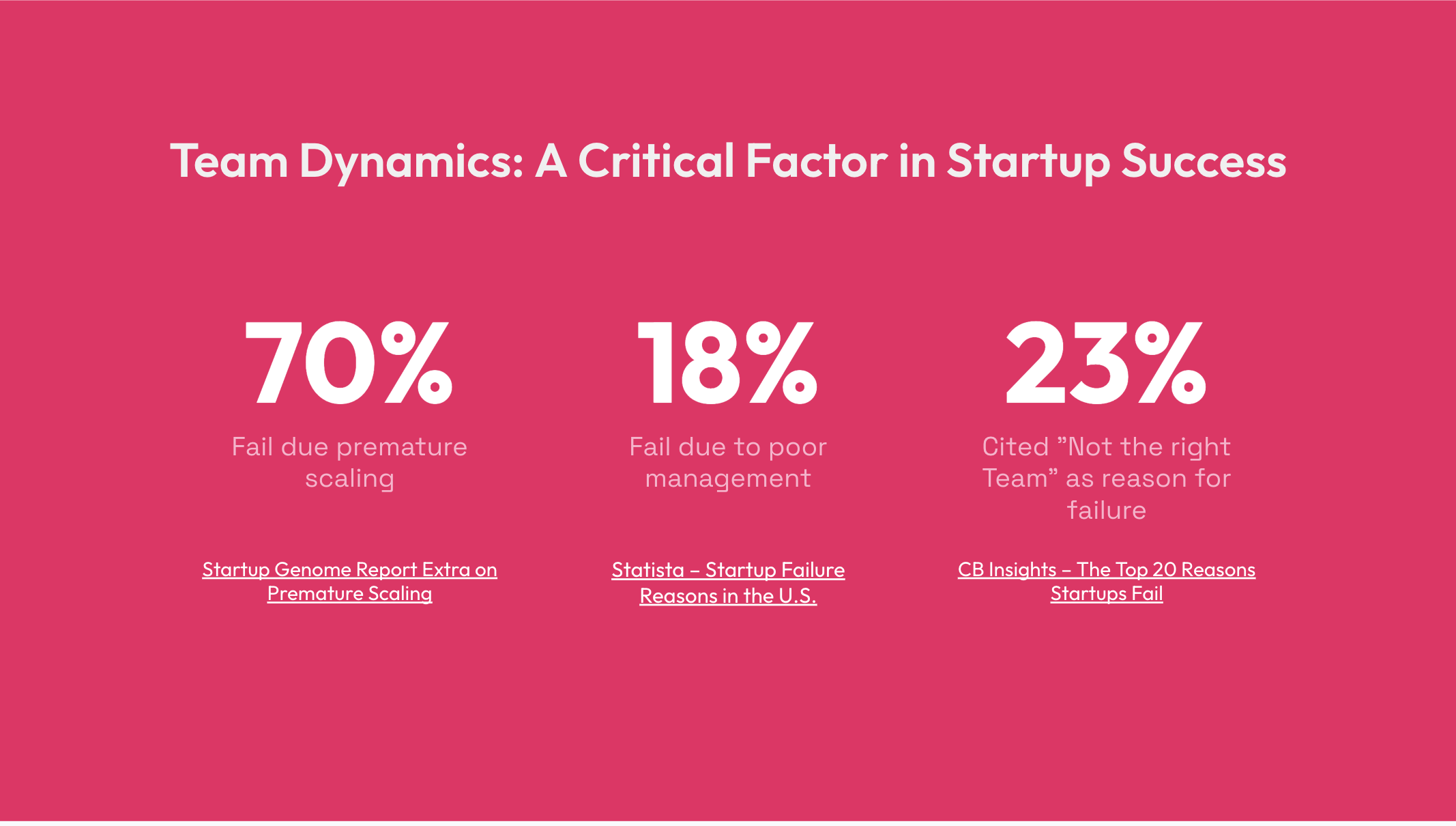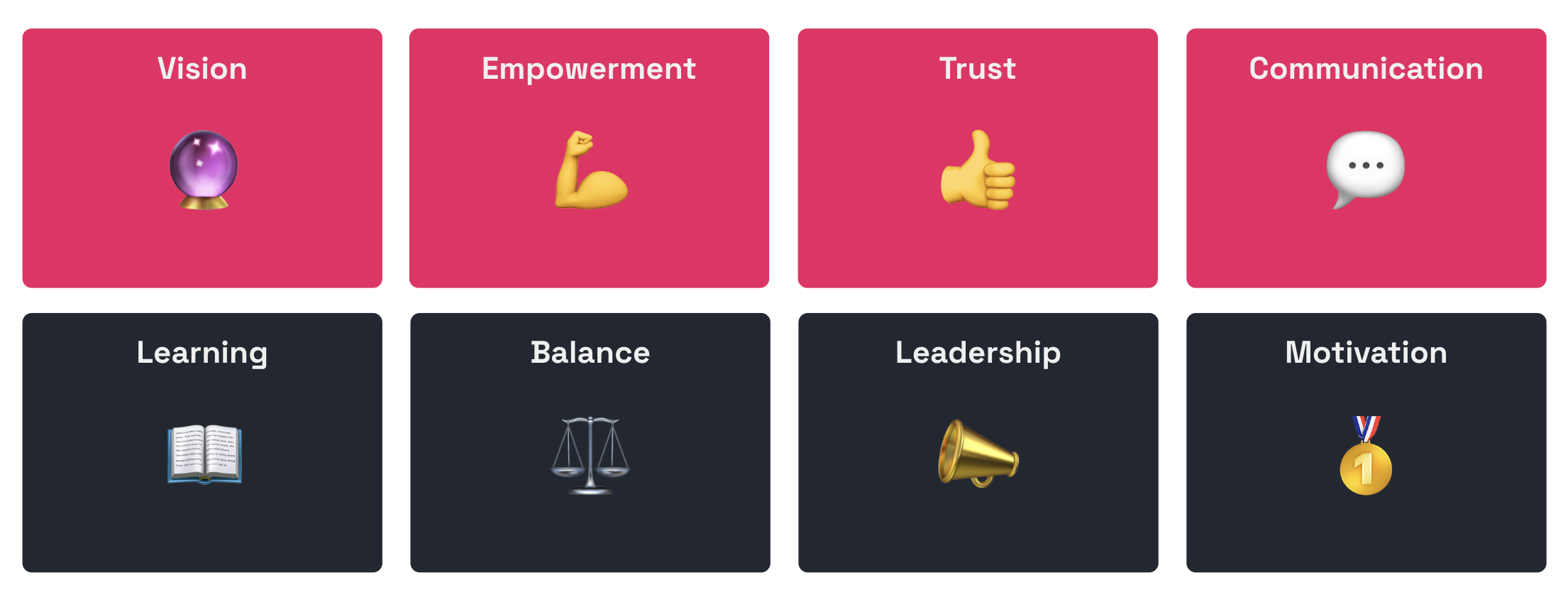

In the fast-paced world of startups, assembling the right team can make all the difference between success and failure. At Xmartlabs, we've spent the last 12 years working with diverse teams across industries and cities while also managing our own growing team of over 100 people. This wealth of experience has given us valuable insights into empowering teams and individuals to reach their full potential.
Recently, our project manager, Agile coach, and product expert, Rafael, shared these insights in a webinar hosted by Angel Squad. Let's explore the key concepts and practical strategies for building high-performing teams that drive startup success.
The True Impact of Team Dynamics on Startup Success

Numbers don't lie: startups with balanced teams that combine both business and technical skills tend to raise 30% more money, experience 2.9 times more user growth, and are 19 times less likely to scale prematurely. On the flip side, 23% of startups fail due to not having the right team, while 18% fail because of ineffective leadership and decision-making processes.
Your team's effectiveness can make or break your venture in an environment with limited resources and fierce competition. High-performing teams give you a competitive edge by innovating faster, solving problems more efficiently, and adapting with agility to market changes.
The 8 Principles of High-Performing Teams
Based on our extensive experience, we've identified eight core principles that contribute to creating an environment where teams can truly excel:

- Convey a clear vision that sets a defined purpose and promotes alignment in your team
- Foster empowerment and autonomy
- Build trust and psychological safety
- Effective communication collaboration
- Continuous learning and improvement
- Balance focus on technical excellence and business value
- Strong leadership and decision-making
- Intrinsic motivation through mastery and purpose.
These principles are interrelated and collectively contribute to creating an environment where teams can excel for real.
1. Clear Purpose and Alignment: Uniting your team's efforts
Establishing a shared vision and aligning team goals with your initiative's vision ensures everyone works towards common objectives. This principle is crucial, especially for non-technical founders who might feel stuck without a CTO. By focusing on a clear purpose and alignment, you can articulate your value proposition and validate ideas through hypotheses and experiments, even without a technical co-founder.
- Define a compelling vision that inspires and unites your team
- State goals clearly, using techniques like SMART goals
- Align individual contributions to ensure everyone contributes effectively
2. Empowerment and Autonomy: Enabling ownership
Empowering your team members by granting them autonomy fosters ownership, accountability, and innovation. This can be achieved by:
- Delegating authority appropriately
- Trusting your team with responsibilities and decision-making within their expertise
- Encouraging self-management and promoting a goal-oriented flexible work environment
- Supporting self-organizing teams through agile or lean principles
- Providing necessary resources and support, including tools and information
- Removing obstacles that hinder autonomy
3. Build Trust and Psychological Safety: Building a solid foundation
A foundation of trust enables team members to express ideas, take risks, and be vulnerable without fear of repercussions or criticism. To build trust:
- Promote transparency and honesty
- Encourage open communication
- Model integrity in your actions and lead by example
- Foster inclusive environments where diverse perspectives are valued
- Address conflicts constructively and establish mechanisms for healthy resolutions

4. Effective Communication and Collaboration: Enhancing teamwork
Clear and continuous communication is essential for teamwork and project success. Enhance communication by:
- Establishing clear communication channels
- Utilizing appropriate tools for your team's needs
- Implementing regular meetings such as daily and weekly syncs
- Encouraging open dialogue and fostering a culture where questions and feedback are welcomed
- Identifying issues early on to ensure everyone is aligned and working efficiently
5. Continous Learning and Improvement: Driving growth
Promoting ongoing development keeps your team adaptable and competitive. This principle can be applied by:
- Investing in professional development
- Encouraging experimentation
- Conducting regular retrospectives
- Balancing rapid development with sustainable practices to reduce technical debt
- Embracing the value of MVP principles for shorter, validated development cycles
6. Balanced Focus on Technical Excellence and Business Value: Aligning excellence with value
It's crucial to ensure technical efforts support business outcomes. This balance can be achieved by:
- Aligning technical expertise with business realities
- Broadening talent pools while maintaining high standards
- Balancing the need for rapid development with maintaining technical excellence
- Reducing technical debt to improve product quality and delivery predictability
7. Strong Leadership and Decision-Making: Guiding the team
Effective leadership steers the team, facilitates decisions, and adapts to evolving needs. Strengthen leadership by:
- Practicing adaptive leadership
- Establishing clear decision-making processes
- Promoting accountability
- Understanding and addressing challenges from different angles
8. Intrinsic Motivation through Mastery and Purpose
Tapping into intrinsic rather than extrinsic motivation drives team engagement and fulfillment. Enhance intrinsic motivation by:
- Providing opportunities for mastery through challenging tasks
- Supporting skill development and growth
- Connecting work to a greater purpose by articulating its positive impact
- Regularly recognizing and rewarding contributions
- Celebrating successes

Conclusion: Investing in your team is investing in your future
By applying these eight core principles, you can create an environment where your team can thrive and achieve remarkable things. Remember that building a high-performing team is an ongoing journey that requires continuous assessment, adaptation, and commitment to improvement.
Your team is your greatest asset, and investing in them is investing in your future and your company. By building solid relationships, promoting a positive culture, and leveraging the connections and resources shared by communities like Angel Squad, you can create an environment where everyone can excel and make your startup journey fulfilling for all involved.
If you'd like to learn more, check out the complete webinar recording, including the audience Q&A session. You can gain even deeper insights into these principles and see how they apply to various real-world scenarios.
Connect with Rafa, our expert speaker, for more in-depth discussions or specific questions about team-building methodologies and experiences. His extensive experience in project management, Agile coaching, and product development can provide valuable insights tailored to your unique situation.
Thanks for reading!

